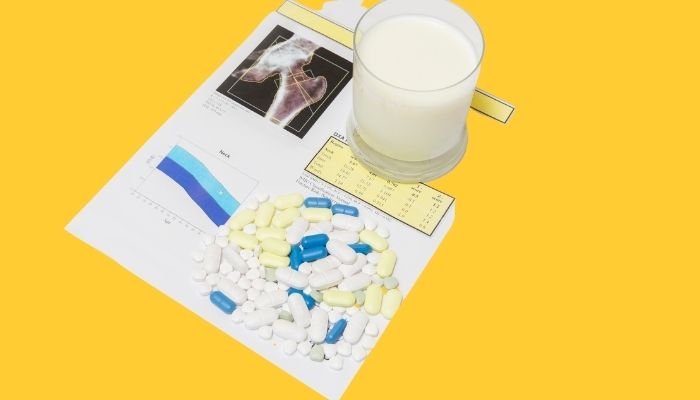A bone density test is a type of test that uses a low dose of X-Ray to measure calcium and other minerals in your bones. This bone mineral density test assesses the strength and thickness of your bones. With age, people’s bones get thinner and when bones become thinner than normal, it is called osteopenia. Osteopenia may lead to a serious condition called osteoporosis. In osteoporosis, your bones become very thin and brittle. Osteoporosis is common among older people and it mainly affects women above 65 years. People with osteoporosis are more prone to getting fractures, especially in their hips, spine, and wrists.

A bone density test measures whether you have osteoporosis or not. Commonly bones of the hip, spine, and forearm are tested.
The cost of the bone density test is Rs. 2730 to Rs. 5500, depending on your location and place.
Please check the price of the bone density test in Delhi/NCR, your nearby centers and other details.
Test Summary
| Also known as | Bone Mineral Density Test, BMD test, DEXA Scan, DXA; Dual-Energy X-Ray Absorptiometry |
| Test Type | Imaging |
| Bone density test includes | To check whether you have osteoporosis or not |
| Preparation | Stop taking calcium supplements before 24-48 hours of the test |
| Reporting | Within 24 hours |
| Test price | The cost of the bone density test is Rs.2730 to Rs. 5500, depending on your location and place. |
| Also included in | Health Insurance Plans |
| Related tests | Vitamin D test, Calcium blood test, and hormonal test |
Osteopenia Symptoms
Osteopenia doesn’t have any prominent signs or symptoms until it develops into osteoporosis. In rare cases, people with osteopenia may have bone pain or weakness. If you go for a BMD screening, then you may have this condition.Why do you need this test?
Your doctor may suggest this test,- To identify diseases before you break a bone
- To check your risk of broken bones (fractures)
- To confirm a diagnosis of osteoporosis
- To monitor the progress of osteoporosis
Bone density tests are not the same as bone scans. Bone scans are useful in detecting fractures, cancer, infections and other abnormalities in the bone.
Though osteoporosis is common in women, men may also get this condition. Your doctor will suggest this test if you
Lost Height
People who have lost at least 1.5 inches (3.8 centimeters) in height may suffer from compression fractures in their spines. This is a prime cause of osteoporosis.Fractured a Bone
When a bone becomes fragile it breaks more easily than expected. Sometimes, due to cough or sneezing, bone fragility occursTaken Certain Drugs
If you use steroid medications like prednisone, it may interfere with the bone-rebuilding process. As a result, you may get osteoporosis.Had a Drop in Hormone Levels
Hormonal changes occur after menopause. Women’s estrogen levels may drop during the treatment of certain cancer. Some prostate cancer treatments may lessen testosterone levels in men.The Preparation for the Test
The bone density test is convenient, easy, and painless. No special preparations are required.- But if you performed a barium exam or had contrast material injected for a CT scan or nuclear medicine test, inform your doctor about the same. Contrast materials might interfere with your bone density test.
- Don’t take calcium supplements for at least 24 hours before your bone density test
- Wear loose and comfortable clothing items. Keep your jewelry and metal items at the home
During the Test Procedure
In the hospital, this test is conducted by using a device where you need to lie down on a padded platform while a mechanical arm passes over your body. The radiation is very low, much less than the amount of chest X-rays. The entire process takes 10 to 30 minutes.By using a small and portable machine, your bone density in the bones at the far ends of your skeleton, such as those in your finger, wrist or heel can be measured. These instruments are called peripheral devices and are often used at health camps and fairs.
The bone density may vary from one location in your body to another. If you test positive on a peripheral device, your doctor may refer you to a follow-up scan of your spine or hip to confirm your diagnosis.
The Interpretation of the Results
You will get your bone density results in the form of a T score. A T score compares your density measurement with the bone density of a healthy 30-year-old. A low T score indicates you probably have some bone loss.Your results could be
- A T score of -1.0 or higher. This is called normal bone density
- A T score between -1.0 and -2.5. This implies you have a low bone density (osteopenia) and may be at risk for developing osteoporosis.
- A T score of -2.5 or less. This reveals you have osteoporosis
- More exercises like walking, dancing, and using weight machines
- Incorporate calcium and vitamin D into your diet
- Taking prescribed medicines that will enhance bone density


